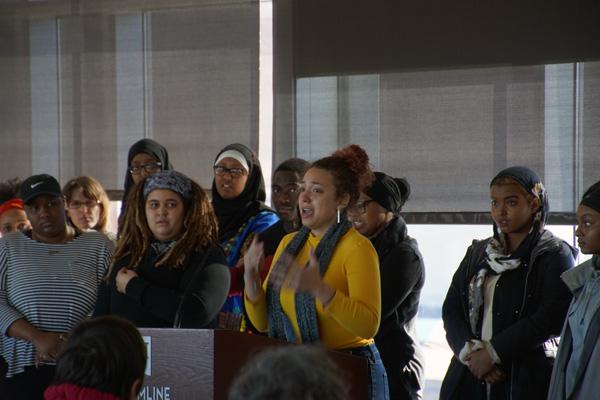Banned voices speak out
Students use teach-in demonstration to address racial issues at Hamline.
February 17, 2017
Hope was both scorned and revelled in during the Teach-in on Feb. 3, as students and faculty began speaking up.
The event started as an informational session on the executive orders on travel and immigration that were passed in January. Near the end of the program, students began to speak about the ways they haven’t felt (and still don’t feel) supported by Hamline.
Sophomore Lupita Herrera, the final speaker scheduled for the event, said that it isn’t new for her to feel unsupported at Hamline.
“I have to sit in class where professors say things like ‘let’s not get political,’” Herrera said. “I don’t understand [that] because these are black and brown bodies we’re talking about and that’s not political.”
Herrera went on to talk about the event itself and how it was advertised and treated by the faculty.
“We are considering this event nonpartisan, and nonpartisan means we have to stay neutral,” Herrera said, “and to stay neutral we are taking the side of the oppressor.”
Herrera called upon people in the audience who weren’t being heard to come and stand with her. Thirty students came up to the podium and stood in solidarity with each other. Some spoke of their rage and how they believe Hamline cares more about students’ money than the actual students.
“They make human bodies illegal. That isn’t a nonpartisan issue, this is a human-being lives issue. I had to move out of the dorms here and I still couldn’t feed myself. That is violence. This is violence against liberation,” recent graduate Michael Martin said.
Junior Marie Carola Schneider, who was born in Cuba, talked about how she had felt looked down upon when she didn’t speak English. She spoke of how the topic of immigration, refugees and race could go on forever and how it was a topic that needed to be discussed.
“There is a lot of different steps,” Schneider said, “There is this issue, and this issue and this issue, and they are all interconnected. People just want to be themselves. It’s a lot of reading, a lot of research, but you need to do it not for class, but for our minds, for us. Not for this country, but for the world. We are people.”
Faculty were soon invited to stand with the students and show their solidarity. By coming up, faculty made their support known.
Nur Mood, Coordinator of Religious and Spiritual life at Hamline came up and spoke about being a refugee.
“It is something no one can imagine,” Mood said, “I don’t want to see on T.V. that refugees bring high risk [of violence], that isn’t true.”
Mood and Gaith Hijazin, Area Coordinator for Residential Life, spoke of how the fear for the refugees and the hardships weren’t new. They had to deal with it all their lives and still do.
“[I wouldn’t] answer phone calls from my mom or dad because I didn’t want to speak my native language, Arabic, so those in the airport didn’t see me as a threat,” Hijazin said. “This executive order is just a continuum of what I’ve had to go through.”
Coming back from Washington D.C, President Fayneese Miller spoke of the travel ban which had stopped both Hamline students and faculty from returning to the United States.
“I wish I could say I came away hopeful, but we were told there was nothing we could do,” Miller said.
Miller asked for everyone in the Hamline community to please not travel to the areas in the travel ban, even if they were visiting family, because the school couldn’t get them back.
Miller went on to say how the community is with them.
“If we are silent we are a part of the problem,” Miller said.

